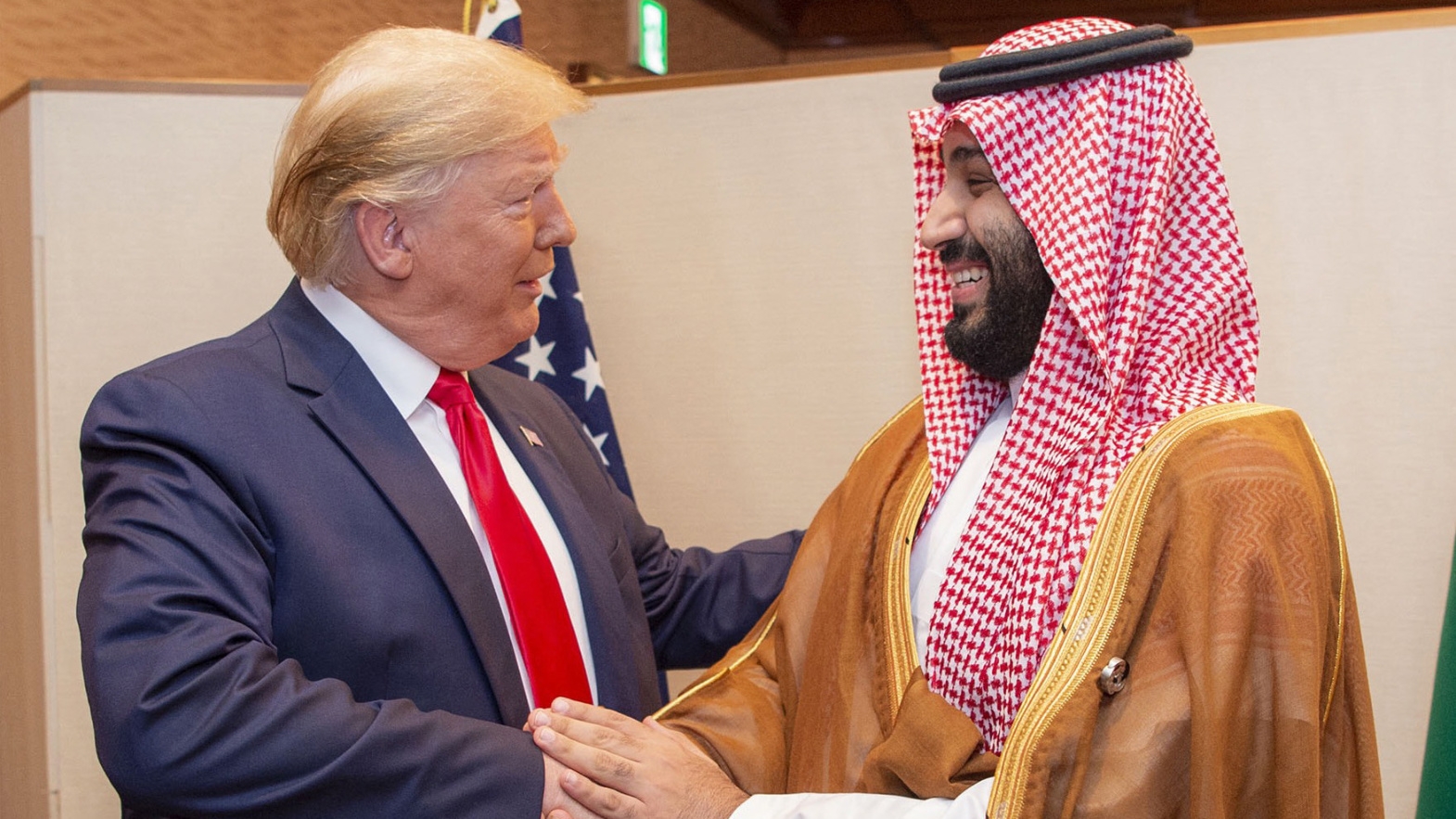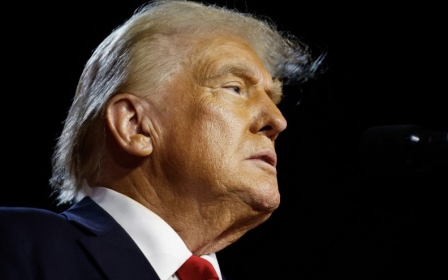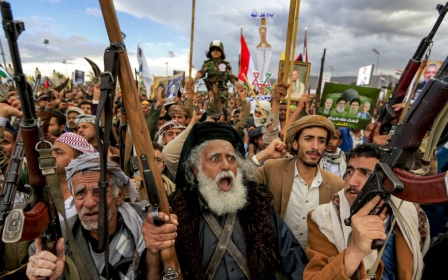US elections 2024: How will Gulf states deal with Trump's second presidency?

As Donald Trump prepares to take up the US presidency following his electoral victory, the world is asking what the return of the populist leader may mean for them.
While the EU braces for a second Trump administration, Ukraine watches nervously and Israel celebrates, eyes have also turned to the Persian Gulf states.
All six members states of the oil-rich Gulf Cooperation Council (GCC) were quick to congratulate Trump on winning the presidential election.
Saudi Crown Prince Mohammed Bin Salman was one of the first leaders to speak to him over the phone. The pair have a strong relationship forged in the aftermath of the Jamal Khashoggi affair, during which Trump refused to turn on the Saudi prince.
The former and now incoming US leader was also an initial supporter of the Saudi-led blockade of Qatar.
New MEE newsletter: Jerusalem Dispatch
Sign up to get the latest insights and analysis on Israel-Palestine, alongside Turkey Unpacked and other MEE newsletters
Stock markets in the Gulf rose in early trade as Trump claimed his victory on Wednesday, indicating some confidence in what his second term may look like.
Here Middle East Eye examines what a new Trump administration might mean for the region.
No necessary preferences
Trump has maintained strong ties with GCC leaders even after his first term ended in 2020, forging several multi-million dollar deals and partaking in quiet, behind-the-scenes diplomacy.
However, the existence of these stable ties did not necessarily translate to an explicit preference for him over the Democrats, according to Gulf experts.
“The Gulf states have learned the lesson the hard way: that they need to develop their own capabilities and be responsible actors who take their own decisions and move matters forward, and be able to deal with whoever that comes in the US or in any other country,” Bader al-Saif, associate fellow at Chatham House and assistant professor of history at Kuwait University told MEE.
According to al-Saif, this may be the one US election that the Gulf had the least stakes in, as the region’s leaders have been able to manage strong relations with both Republicans and Democrats and associated institutions while prioritising their interests in recent years.
“The incoming US administration needs to know that we are trying to balance different superpowers because each one contributes to us in a different way,” he added.
GCC states have maintained strong ties with US rivals Russia and China over the past few years, a period which also saw the US take an increasingly hostile approach towards Moscow and Beijing.
Gulf states have also largely turned over a new leaf in their relations with Iran.
The cooling of tensions was spearheaded by Saudi Arabia restoring ties with Tehran in 2023 following years of diplomatic hostility and proxy conflicts.
It may present a concern these states could have with a Trump presidency.
While he was often accused of being lenient with Russian President Vladimir Putin, Trump implemented highly hawkish policies towards China and Iran during his first term as US president, a position he is not expected to shift on.
“In Trump’s first term, his policies were much more in line with Saudi-UAE policies in the region: maximum pressure on Iran, normalisation with the Israelis, so there was more alignment in his first term on some key things, especially Iran,” said Anna Jacobs, a Gulf states-focused senior analyst at Crisis Group.
Now, however, Jacobs says that the GCC “have committed to a cool relationship with Iran, a relationship where they can talk and deescalate when they need to, and I think that most of them, Riyadh in particular, find having this channel with Iran to be extremely useful.”
The Gaza question
The end of Trump’s presidency was marked by the Abraham Accords, or his success in normalising relations between Israel and two GCC states, the UAE and Bahrain, as well as two other Arab states, Morocco and Sudan.
While Biden made major efforts in continuing this policy of normalisation, hoping to establish formal ties between Israel and Saudi Arabia, these plans fell flat following the outbreak of Israel’s war on Gaza in 2023, and Riyadh’s insistence that it will not normalise without the guaranteed establishment of a Palestinian state.
“All Gulf states want to see the creation of a Palestinian state,” said Elham Fakhro, a researcher and author of a book on the Abraham Accords. “The UAE for example has conditioned its involvement in any day-after plan on the establishment of a Palestinian state.”
Gulf states, including those that have established ties with Israel, have been overtly critical of its actions in Gaza, with Saudi Arabia even recently calling it a genocide.
'All Gulf states want to see the creation of a Palestinian state'
- Elham Fakhro, researcher
Israel has killed over 43,000 Palestinians in Gaza since the start of the war and destroyed much of the enclave’s civilian infrastructure while restricting aid from entering.
“On this front, Biden gave [Israeli Prime Minister Benjamin] Netanyahu unconditional political and military support to carry out [its actions] in Gaza and refused to exert any meaningful pressure on him to reach a ceasefire,” Fakhro added. “Trump has stated that he’d let Netanyahu ‘finish the job’ - an effective continuation of the same policy. This is the main issue that hangs in the balance and where Gulf leaders will try to convince Trump of their position.”
Trump is known to have close relations with Netanyahu, who was quick to celebrate the Republican’s win over Kamala Harris on Wednesday.
However, Jacobs notes that despite his unpredictability, Trump has also consistently held anti-war stances, wanting to keep US forces away from Middle Eastern conflicts.
Jacobs says this may lead to Trump wanting to bring the war to an end, but with the potential risk of it being “entirely with Israeli interests in mind more than anything else”.
The Qatari outlier?
While most GCC states maintain a largely uniform position as far as foreign policy is concerned, Qatar may view things slightly differently.
“I think the Qataris are probably nervous about a return of Trump in the White House,” said Jacobs, adding that the Saudi-led years-long blockade of Qatar started - and ended - during Trump’s first term.
Doha’s foreign policy has often been detached from its Gulf neighbours, leading to direct tensions and diplomatic confrontations at times.
A large US military base is also present in the country.
“I imagine immediate concerns for them are going to be maintaining the bilateral relationship, and that the security relationship remains strong, and making sure that their non-Nato ally position is maintained,” Jacobs added.
On the Gaza issue, while Saudi Arabia and the UAE are no admirers of Hamas, much of the Palestinian group is based in Qatar, a key financial supporter.
“I think [the Qataris] are waiting to see how Trump will handle the Gaza talks, how much he will scrutinise Qatar’s relationship with Hamas, whether he and the Republicans in the Senate and the House will put pressure on Qatar over the relationship to close [Hamas’] office,” Jacobs added.
Nevertheless, experts say that all GCC states are resorting to high levels of pragmatism in order to secure their interests regardless of the US president, especially as Trump is known to be unpredictable on the world stage.
“The incoming administration will certainly find a willing partner in the Gulf states if it supports them in preserving their standing in the region, protecting their security interests, promoting their trade interests, and provides support in ending Israeli occupation of Palestinian lands,” said al-Saif.
Middle East Eye delivers independent and unrivalled coverage and analysis of the Middle East, North Africa and beyond. To learn more about republishing this content and the associated fees, please fill out this form. More about MEE can be found here.






